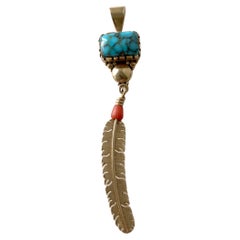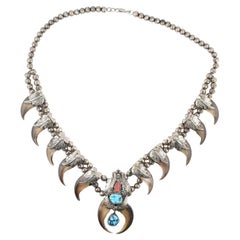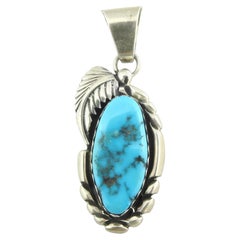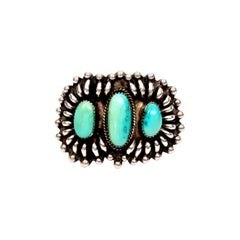Tsosie Turquoise
Early 2000s American Native American Pendant Necklaces
Coral, Turquoise, 14k Gold, Gold
Vintage 1980s Native American Pendant Necklaces
Coral, Turquoise, Sterling Silver
Recent Sales
20th Century Pendant Necklaces
Turquoise, Sterling Silver
20th Century Cuff Bracelets
Turquoise, Sterling Silver
20th Century American Native American Pendant Necklaces
Coral, Lapis Lazuli, Turquoise, Sterling Silver
Late 20th Century American Modernist Pendant Necklaces
Coral, Turquoise, Gold, 14k Gold, Yellow Gold
People Also Browsed
Vintage 1950s Mexican Native American Cuff Bracelets
Turquoise, Silver, Sterling Silver
Antique 1840s British Early Victorian Link Necklaces
Turquoise, Gold
21st Century and Contemporary Native American Cuff Bracelets
Coral, Lapis Lazuli, Turquoise, Gold, 14k Gold, Yellow Gold, Silver, Ste...
The Legacy of Turquoise in Jewelry Design
The thought of vintage and antique turquoise jewelry often conjures up images of striking Navajo bracelets and necklaces worn with a denim shirt and cowboy boots. This all-American look has been celebrated by fashion designers like Ralph Lauren and Tommy Hilfiger on their runways and in ad campaigns. In the October 2016 issue of Vogue magazine, Tom Ford said he only wears turquoise jewelry at his Santa Fe ranch. So what is it about this gorgeous blue-green stone that makes us wish that we were born in December?
It’s not surprising that turquoise is abundant in New Mexico and Arizona because, according to the Gemological Institute of America (GIA), it needs to be in “dry and barren regions where acidic, copper-rich groundwater seeps downward and reacts with minerals that contain phosphorus and aluminum.
Turquoise is not found in a single crystal but is a combination of microcrystals. Its appearance, waxy and opaque, is attributed to its structure and composition. “It’s an aggregate of microscopic crystals that form a solid mass. If the crystals are packed closely together, the material is less porous, so it has a finer texture. Fine-textured turquoise has an attractive, waxy luster when it’s polished. Turquoise with a less-dense crystal structure has higher porosity and coarser texture, resulting in a dull luster when it’s polished,” notes the GIA. Since no one wants to set a dull piece of turquoise, porous turquoise is often treated to make the stone more attractive.
In the United States, there have been discoveries of turquoise from 200 B.C. It is not just loose turquoise stones that have been found, but entire suites of jewelry from prehistoric times. In the late 19th-century, the Navajo Indians, who learned silversmithing from the Spanish, started to make beads out of turquoise and eventually combined it with silver around the 1880s. Initially this jewelry was for ceremonial purposes, but it became fashionable once the tourism in the Southwest picked up in the beginning of the 20th century.
Find antique and vintage turquoise rings, necklaces, bracelets and other accessories on 1stDibs.
Finding the Right Pendant-necklaces for You
Whether you’re layering multiple jewelry pieces or opting for a single strand, vintage pendant necklaces are versatile accessories that can elevate your casual wear as easily as they can add a creative flourish to your formal attire.
The earliest jewelry was less about accessorizing than it was about wearers arming themselves with amulets. In Ancient Egypt, some amulets featured a loop so that they could be strung around one’s neck. While rubies have long been one of the few gemstones that can give diamonds a run for their money, members of some ancient civilizations valued the stones from the get-go, donning ruby pendants as well as other stones with the belief that these adornments would bring protection, healing powers or strength. Today, we still wear our charm bracelets and charm pendants around our necks for good luck.
Later, pendant necklaces, like most fine jewelry, were worn strictly by royalty or the upper class and conferred wealth and prestige. This changed over time, thankfully, as wearing jewelry became more widespread, a democratized means of personal expression.
During the 18th and 19th centuries, pendant necklaces evolved from their status as spiritual amulets, but the jewels still carried deep personal significance. Victorian pendants, in particular, were part of the “mourning jewelry” tradition. Wearers would embed their pendants with locks of hair from a deceased loved one as a way of grieving in the wake of a loss. In the case of cameo jewelry, some pendants were even decorated with miniature hand-carved portraits in a detailed raised relief. Today, portraiture is still a characteristic of many of the hand-carved pendant necklaces offered by Italian jewelry house Scala Gioielli.
Luxury fine jewelry brands such as Cartier, BVLGARI and David Yurman offer their own unique interpretations of the cherished accessory, embellishing platinum or gold pendant necklaces with diamonds, sapphires and other stones.
On 1stDibs, find an extraordinary range of vintage pendant necklaces and other necklaces today.
Read More
This Victorian Necklace Features a Rainbow of Gems
If jewelry could talk, we know this piece would have good stories.
A Centuries-Old Style, Lockets Have Never Lost Their Romantic Appeal
Emblems of heartfelt emotion, elegant vessels for photos and keepsakes and perfect for layering, these special ornaments are an essential component of any thoughtfully curated jewelry collection.
This Van Cleef & Arpels Necklace Is an Heirloom in the Making
With more than 100 carats of diamonds, this vintage stunner converts into different styles, making it as versatile as it is breathtaking.
[Survey] Two-Thirds of Jewelry Gift Recipients Don’t Want to Be Surprised
Givers of fine gems enjoy surprise more than receivers, and women more than men. Find out what else our survey of 3,000 Americans revealed.
Next-Level Pearls That Go Well Beyond the Expected
Organic shapes, surprising textures, shimmering colors and inventive embellishments take the new generation of pearl jewelry from classic to cutting-edge.
7 Vibrant Jewels for a Breezy Late-Summer Wardrobe
Soak up the pleasures of the season with a these bold gems.
Whether Worn Alone or Layered, These Chain Link Necklaces Are Trending
Learn more about the stylish links that have passed the test of time.
Meet the Dapper, Mustachioed Parisian Who’s Tops in Crafting Enticing Jewels
After more than a decade creating the iconic Lanvin gems of the Alber Elbaz years, designer Elie Top dove into the world of fine jewelry, mixing silver and gold to create his own striking, timeless look.



